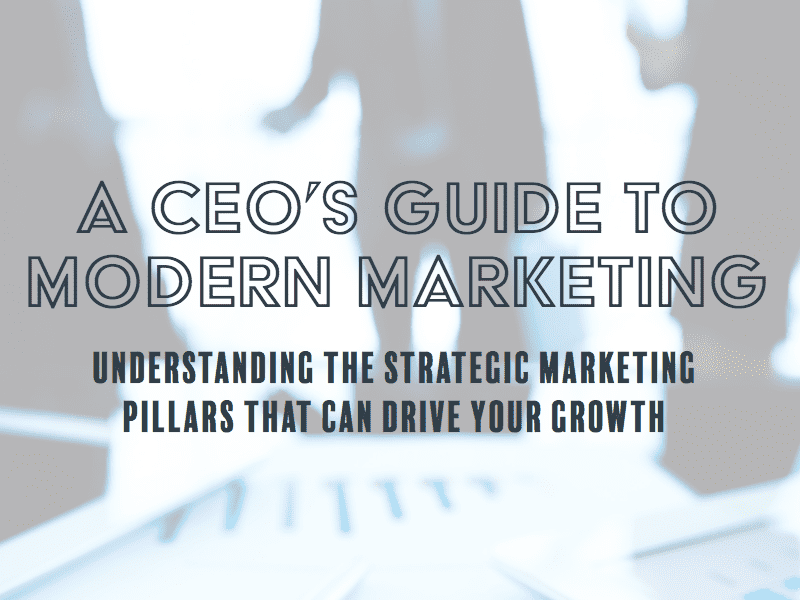SEO: Going Beyond Basic Keywords
At its basis, SEO is known for using the right keywords to attract users to your site. But there is more to SEO than just finding the magic words and sitting back and watching website visitors users flow in.
When your SEO strategy includes technical, on-page, and off-page optimizations, your website will benefit from better SERP rankings and you’ll be better able to keep up with Google algorithm updates as they roll out. Additionally, a well-rounded SEO strategy will help you dig deeper into your keywords and tailor your content to fit your prospect’s needs.
Before we get into a robust SEO strategy that stretches beyond picking basic keywords, here’s how your website can benefit from investing in SEO.
Business Benefits of SEO
- Increase your reach over your competitors. This one is easy: if you’re on the first page of a SERP, that means that you have valuable digital real estate that your competitor doesn’t. The first Google result captures over 25% of users and the first page captures 71% of clicks, meaning that if you’re not on the first page, you’re missing out on valuable traffic that could generate leads.
- Increase demand generation by generating thought-leadership. Ranking high in the SERP shows that your website is deemed trustworthy and authoritative by the search engine. This vote of confidence will increase your prospect’s trust in your site, inspiring them to look to you for the answers. Prospects that trust your website are more likely to stick with you, increasing their likelihood of converting in the future.
- Increase visits by your target audience. While it’s exciting to grow your web traffic, you want to make sure you’re attracting the right visitors that are looking for the solution that your website can provide. More qualified traffic = more conversions.
To reap these benefits from organic traffic, your website will require ongoing adjustments and analysis to ensure it is as optimized as possible for search engines.
Types of SEO Optimization
1) Technical Optimization
Optimizing your website for technical SEO means you’re making your page easy for search engine bots to crawl and index. Ask yourself: What is limiting search engines from efficiently crawling and indexing my site? How do I fix it? Here are common technical SEO practices:
- Enhance page load speeds (Check out Google PageSpeed Insights for help on this).
- Ensure your site is mobile-friendly. Google uses a mobile-first indexing method, so implement Google’s recommended best practices to be crawled and indexed the mobile crawl bots.
- Set up an XML sitemap so the crawl bot understands how your pages relate to each other. In addition to having an optimized sitemap, internal linking can help search engines crawl and index your pages more efficiently.
- Use structured data where applicable. This helps search engines to quickly understand the purpose of your page and pull the most important pieces for related search queries.
- Run your pages through Google Search Console or Bing Webmaster to encourage search engines to crawl and index your pages more quickly.
- Encrypt your website with an SSL certificate to improve website security and increase trust with search engines.
2) On-Page Optimization
On-page optimization refers to aspects of your website that you can control right on your website, such as the content on the site and how users experience your site. While technical SEO can fall under on-page optimization, we are focusing on the user-facing aspects of your site.
When you do on-page optimization, ask yourself the following questions:
- Does the content and user experience on my site serve my users better than my competitors’ sites do?
- Does my site content and UX follow the most recent Google algorithm updates?
Here are some common on-page SEO practices to use on your site:
- Enhance the UX with quality and relevant images. Make sure to add optimized titles and alt text on your images to help your page rank and improve the experience for all users.
- Write a title tag that will help you rank. Title tags are what search engines show on the SERP. You’ll want to make sure yours is applicable to the page content, enticing for users, and follows best practices. Check out Search Engine Journal for more tips on optimizing your title tag.
- Write an enticing meta description. The meta description, though not directly impacting your website’s rankings, has an indirect effect by influencing users to click to your site. For this reason, you’ll want to make sure that the meta description aligns with the search intent of the user and the purpose of the page.
- Ensure the content is easy to read and the page is easy to navigate. Keep in mind that over half of internet traffic is mobile, meaning that content should be engaging and easy to consume for all types of devices.
3) Off-Page Optimization
Off-page SEO is most relevant for companies where location is a key point of information. However, off-page optimization can help any business improve SERP rankings, so don’t discount it. Off-page SEO tasks are typically ones that take place outside of your website, such as the following:
- Create and optimize your Google Business Profile. Your profile will be even more beneficial to your rankings if you have good reviews.
- Create and populate social media channels for your business. At bare minimum, be sure to add your business contact information, your branding, and a link back to your website.
- Capitalize on beneficial backlink opportunities for your site. Backlinks from websites with high authority are valuable for your own site’s authority.
Don’t Forget the Backbone of SEO: Content
We started this post by saying SEO goes beyond keywords, which you’re now very well aware of. However, a solid content strategy is the backbone of a successful SEO strategy. But it does reach far beyond basic keywords. Your content needs to align with your prospective customers’ pain points and their location on the buyer’s journey. Here’s how:
Intent-Driven Keywords are Key
Do you know what your prospects are looking for when they arrive at a web page organically? You should! Dig deeper into the keyword that your website is ranking for and understand the user’s purpose behind the keyword and tailor your content to fit that need. Semrush categorizes intent-driven keywords into these four main categories:
- Navigational: Users are looking for something specific such as a phone number, address, or website.
- Commercial: Users are looking to compare options leading up to a purchase.
- Transactional: Users are seeking to complete a specific action such as making a purchase.
- Informational: Users are looking for more information before they make a decision.
On top of being a valuable resource for your prospects, search engines will also reward pages that are relevant and helpful to users’ queries. Keep in mind that though we cannot always be 100% sure about what the user is looking for or how they behave once they reach your site, aligning the content of your page with the keyword intent can positively impact your conversion rates and help you rank higher for your keyword.
Optimize Your Site for Search Engines Regularly
The beautiful and frustrating thing about the internet is that it is always changing. Google algorithms update multiple times a year, meaning that to stay on top of the SERP and rank well, you’ll need to stay on top of your SEO.
View SEO less like a one-time investment and more like an apartment that you’re paying rent on. You’ll need to invest at least a few hours each month in your website’s SEO to have a shot at ranking at the top of SERPs and staying there.
Questions on how to kickstart your SEO strategy and keep it rolling? Though we don’t like to brag, as a B2B consulting marketing firm, we at Marketri know quite a bit about developing and implementing holistic SEO strategies, including identifying and capitalizing on intent-driven keywords — and we’re here to help. Book a free consultation with our CEO, Deb Andrews, to get started on advancing your SEO strategy beyond basic keywords.





